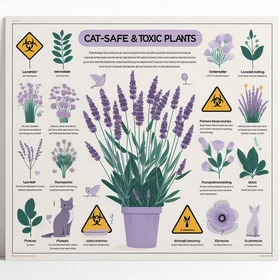Essential Oils in Lavender and Their Effects on Cats
Introduction:
Lavender, known for its calming scent, is a popular essential oil. However, when it comes to cats, caution is essential. Let's explore the effects of lavender essential oil on our feline friends.
Lavender Essential Oil and Cats:
- Toxic Compounds: Lavender contains linalool and linalyl acetate, which can be harmful to cats.
- Metabolism Differences: Cats lack the enzymes needed to process these compounds effectively.
- High Sensitivity: Cats are more susceptible to essential oils due to their unique liver metabolism.
Symptoms of Lavender Toxicity:
- Gastrointestinal Upset: Ingesting lavender oil can lead to nausea, vomiting, and diarrhea.
- Central Nervous System Effects: Cats may experience depression, lethargy, or difficulty walking.
- Liver Damage: Significant exposure can harm the liver.
Safety Measures:
- Avoid Diffusing: Refrain from diffusing lavender oil around cats.
- Topical Use: Never apply undiluted essential oil directly to your cat's skin.
- Consult a Vet: If you suspect lavender poisoning, seek veterinary assistance promptly.
Remember, while lavender is soothing for humans, it's best to keep it away from our feline companions.
Lavender, known for its calming scent, is a popular essential oil. However, when it comes to cats, caution is essential. Let's explore the effects of lavender essential oil on our feline friends.
Lavender Essential Oil and Cats:
- Toxic Compounds: Lavender contains linalool and linalyl acetate, which can be harmful to cats.
- Metabolism Differences: Cats lack the enzymes needed to process these compounds effectively.
- High Sensitivity: Cats are more susceptible to essential oils due to their unique liver metabolism.
Symptoms of Lavender Toxicity:
- Gastrointestinal Upset: Ingesting lavender oil can lead to nausea, vomiting, and diarrhea.
- Central Nervous System Effects: Cats may experience depression, lethargy, or difficulty walking.
- Liver Damage: Significant exposure can harm the liver.
Safety Measures:
- Avoid Diffusing: Refrain from diffusing lavender oil around cats.
- Topical Use: Never apply undiluted essential oil directly to your cat's skin.
- Consult a Vet: If you suspect lavender poisoning, seek veterinary assistance promptly.
Remember, while lavender is soothing for humans, it's best to keep it away from our feline companions.
Symptoms of Lavender Poisoning in Cats
Lavender, while beloved for its soothing aroma, can be hazardous to our feline companions. If a cat ingests lavender or is exposed to its essential oil, watch out for the following signs:
Gastrointestinal Upset:
Nausea, vomiting, and diarrhea may occur.
Cats may show reluctance to eat.
Central Nervous System Effects:
Lethargy, depression, or weakness.
Abnormal behavior or difficulty walking.
Liver Damage:
In severe cases, lavender toxicity can harm the liver.
Prevention is key. Keep lavender products away from your cat, and if you suspect poisoning, seek immediate veterinary assistance.
Gastrointestinal Upset:
Nausea, vomiting, and diarrhea may occur.
Cats may show reluctance to eat.
Central Nervous System Effects:
Lethargy, depression, or weakness.
Abnormal behavior or difficulty walking.
Liver Damage:
In severe cases, lavender toxicity can harm the liver.
Prevention is key. Keep lavender products away from your cat, and if you suspect poisoning, seek immediate veterinary assistance.
Tips for Keeping Your Cat Safe Around Lavender
When it comes to enjoying the calming scent of lavender while ensuring your cat's safety, a few simple tips can make all the difference. Firstly, opt for cat-safe lavender varieties that are less toxic to felines, such as Lavandula angustifolia. When using lavender products at home, ensure they are diluted properly and used in well-ventilated areas to minimize exposure.
Consider planting lavender in hanging baskets or elevated areas where your curious cat can't reach. Regularly monitor your cat for any signs of discomfort or unusual behavior when in the presence of lavender. Lastly, consult your veterinarian for specific advice on how to create a cat-friendly environment with lavender while prioritizing your pet's well-being.
Consider planting lavender in hanging baskets or elevated areas where your curious cat can't reach. Regularly monitor your cat for any signs of discomfort or unusual behavior when in the presence of lavender. Lastly, consult your veterinarian for specific advice on how to create a cat-friendly environment with lavender while prioritizing your pet's well-being.



